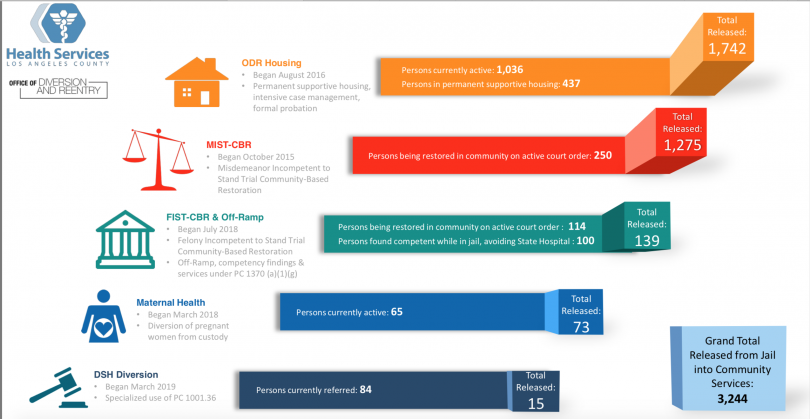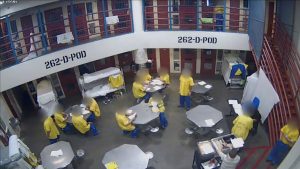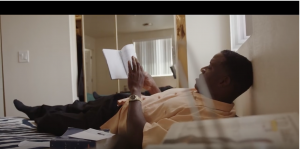On Tuesday, the Los Angeles County Board of Supervisors directed the county’s Office of Diversion and Reentry to draft a plan for expanding the ODR’s innovative program designed to break the cycle of mental illness, incarceration, and homelessness, by diverting inmates with serious mental health issues and substance abuse disorders from jail and providing them with intensive case management and supportive housing—a strategy that supporters say has consistently managed to change lives for far fewer dollars than the cost of a stay in LA County jail or in a county hospital.
Here’s the deal:
More than four years ago, on August 11, 2015, LA’s board of supervisors voted unanimously—and historically—to create the Office of Diversion and Reentry (ODR) within the Department of Health Services.
The 2015 motion, authored by Supervisors Mark Ridley-Thomas and Sheila Kuehl, authorized the executive director of the newly created ODR to oversee the county’s efforts to divert the mentally ill, homeless, and those with substance abuse problems out of the criminal justice system and local lock-up, and into appropriate housing and treatment.
Respected Los Angeles Superior Court Judge Peter Espinoza left the bench after 25 years to take the job as the leader of the ODR.

Judge Peter Espinoza, Director of LA County Office of Diversion and Reentry with Supervisor Mark Ridley-Thomas at Youth Diversion Summit, courtesy of Supervisor Ridley-Thomas
To date, The ODR’s programs and partnerships have diverted over 3,200 LA residents away from the county’s jails and into community-based recovery settings.
Yet, despite those 3,200 diversions, the number of people with serious clinical needs who still wind up in LA County’s jail system has continued to rise.
As of May 2018, according to the Office of the Inspector General, there was a total of 4,112 male and 934 female mental health patients in LA County custody.
This year, an estimated one-third of the men and women in the county jail system – approximately 5,300 people – suffer from mental illness.
Reform advocates, like the ACLU’s Peter Eliasberg, have repeatedly suggested that even the county’s high numbers may be undercounted.
(Even the Bureau of Justice Statistics estimates that 64 percent of the jail population nationwide has a mental health problem.)
It doesn’t help that, according to several prominent studies, people with mental illness are more likely to be arrested than those without it, even when their conduct is the same, or in some cases, less serious.
Once in jail, according to the National Alliance on Mental Illness, those with mental health conditions stay longer than their counterparts without mental illness. They are also more at risk of victimization.
It should, therefore, be no surprise that those with serious mental illness do not stabilize or improve while jailed. Instead, they typically become much worse.
Inmates with mental illness, Eliasberg wrote last summer, “spend more time in restrictive housing and are disproportionately confined in solitary.” They are also likely to encounter “additional physical or emotional trauma,” particularly when their past traumatic experiences and general emotional conditions clash with jail life, as they most often do.
The good news is that, according to a recent report from the Department of Health Services, 56 percent of the 5,300 people in county lock-up who suffer from mental illness– nearly 2,900 people – may be eligible to benefit from ODR housing if the program is scaled up.
Help on the way
With all this and more in mind, Ridley-Thomas and Kuehl authored the new motion, passed Tuesday, which instructs the ODR to create a plan to greatly expand its effective network of community-based services for those in need of diversion.
The new services will include more interim housing, more permanent supportive housing, and enough staffing for the ODR and its partners to actually make this expansion plan work.
According to Ridley-Thomas and Kuehl, at a cost of $70 a day per participant, the existing ODR housing has been successful in keeping 90 percent of its participants in stable housing for at least six months. And ODR housing manages to provide its life-changing services for significantly less cash than a stay in one of LA County’s jails would have cost.
“Expanding ODR Housing will help us treat mental health and substance abuse disorders, tackle homelessness, and use taxpayer dollars more efficiently – all without compromising public safety,” said Ridley-Thomas, in an emailed statement. “We simply must double down on diversion because one cannot get well in a cell.”
Supervisor Kuehl called Tuesday’s action “a true inflection point,” not only for the Office of Diversion and Reentry, “but for the county’s whole approach to justice,” she said. “We now have abundant evidence that people with serious mental health needs can be appropriately and safely served in the community, instead of in jail. Today’s action is an expression of the Board’s seriousness in finding the resources to expand this very important work.”
Diversion that works
Initially, ODR housing was available only to people whose cases were heard in the Superior Court’s downtown Los Angeles Central District.
Then starting last month, two additional courthouses began offering the program. This represented a geographical expansion but – without additional resources – it did not increase in the number of clients who could be served.
Tuesday’s motion hopes to address that problem with a plan to expand ODR housing to all of the 12 geographic districts within the Superior Court system.
“We are very excited to be working with the Board of Supervisors and our justice partners to expand the important work of diverting people from the jails into community-based care,” said the ODR’s Espinoza “Our programs continue to demonstrate that housing stability and intensive care can reduce the endless cycle of homelessness, recidivism, and incarceration for our most vulnerable citizens.”
To demonstrate the widely-recognized worth of the diversion program, Ridley-Thomas’s office pointed to a former jail inmate named Leonard Brown, who was diagnosed with bipolar disorder, had repeatedly been homeless, and not-surprisingly kept cycling in and out of the county’s lock-ups.
“It’s a hard thing to say but jail had been like a second home,” Brown said in a statement. “Getting released and not having an opportunity to participate in treatment – the cycle kept continuing.”
Since he became a participant of ODR Housing, said Brown, “I have been able to grow and get my life back.”
If you’d like a better idea of the difference that the ODR Housing makes in the lives of those it serves, check out the video above.
Get this and other essential justice stories delivered directly to your inbox by subscribing to The California Justice Report, WitnessLA’s weekly roundup of news and views from California and beyond. Read past editions – here.




Ok but then how do you get la deputies to stop pay for play with female trainees and stop male deputies from sexually assaulting female inmate’s.
Do they have a mental illness? Can they not control themselves around female staff and inmates?
CELESTE: YOU KNOW THAT TODAY IS NATIONAL MEMORIAL FOR PEACE OFFICERS? PRESIDENT TRUMP IS HONORING THOSE WHO GAVE THEIR LIVES FOR OUR SAFETY. HOW ABOUT AN ARTICLE ABOUT JUST ONE SLAIN OFFICER?
You clearly have issues and hate law enforcement. Whether it be from a bad personal experience, that of someone you know or just because it’s the thing to do because the media said do. In any case, good luck working through your issues.
The majority of law enforcement officers, whether they be police, FBI, corrections or whatever aren’t that hard up enough to want anything to do with the suspects or criminals they arrest. Pay attention to the key operative word…majority.
I wonder how many people are sitting at Twin Towers because they didn’t want to take the deal their Public Defender and The District attorney were offering them. And all for the sole purpose of keeping their shady back door tactics from being exposed. They did it to me as a Deputy Sheriff. I was gifted a bullshit D.V case by my Captain at Pico to justify a previous D.V case gifted by my vindictive ex with a few LASD folks in her pocket. The funny part is the ex was so dialed in with her LASD buddies that she didn’t have to call 911. She was allowed an exclusive open door policy at my station not once, but twice . And the connections my ex had with DCFS made my experience with my children all the more amazing. And the ex had the nerve to sue the County because the Department was covering for me and violating her civil rights!, I was lucky enough to have my case transferred to Department 95 in my most recent D.V production. That was just as exciting as being waist chained and escorted to the mental housing unit in my neatly pressed yellow/blue outfit. They took care of me by promoting the Captain at Santa Clarita just so he can oversee my stay at Twin Towers. Bunch of cowards!! Lmao
SpookedSoSo, I’d like to hear more about pay for play. If you want to talk about it send me a DM on Twitter, I’m at @laurenleewhite.
Many of the folks locked up in LA County mental health jail are either playing the system in the hopes of getting a lighter sentence, afraid to go main line housing or being held at the discretion of the mental health court and the Department of Mental Health. Many of the mentally I’ll homeless are treated for a minor charge, go to court and are given avde sentence of time served. The problems is, once the court sees they are mentally I’ll, they can’t be simply released back into society. Here’s were the jails become de-facto metal health hospitals.
We can’t build mental health hospitals, and “waterhouse people” but we can hold them in jails under “convenient legal pretense” which amounts to the same thing.
The majority of you are racist pigs. I know bc I saw with my own eyes. Ur very aware of it or ur blind. Ur response should come with a disclaimer, but unfortunately for me u pigs think ur bad ass bullies when u have a gun, a badge, and a radio. Come to my block and it would be a different story but thats asking too much.
Oh I have a phenomenal story. We’ll be in touch…
How about a story about inmates getting beat to crap and pepper sprayed for no reason. I’ll wait?
GTFOH….
Spook: Switch to decaf!
show ur face and u got it
do u have instagram?
No…I thought so poser with a badge and a walkie lmaooo